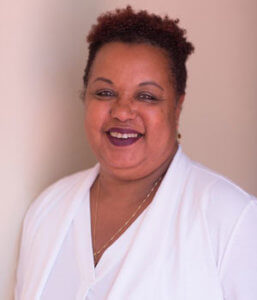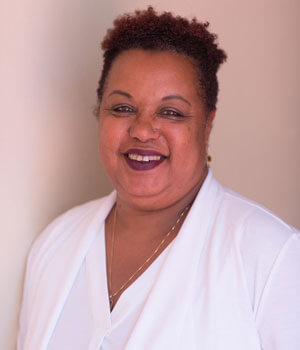An Interview with Andrea Johnson, Executive Director, Courageous Conversation Global Foundation
Andrea Johnson, Executive Director, Courageous Conversation Global Foundation
Creative. Curious. Engaged.
Twitter | LinkedIn | Facebook
Tell me about your current role?
I’m the executive director of Courageous Conversation Global Foundation which was founded three years ago. The foundation was created as an extension of a 25-year history of racial equity work that Pacific Educational Group had been doing in the for-profit arena. I had been involved with the for-profit side for eight years before the foundation’s launch and the natural next step was to take this work into the nonprofit space. I had experience as a grants manager, a grant writer, and a director of equity for a school district in a Chicago-area suburb. The marriage of the nonprofit grant cycle and the racial equity world was a pretty natural one. I spent the first year building the infrastructure of the foundation and getting the board shored up, year two developing programming and the past year implementing programs.
The Foundation’s goal is to reach deep in communities interested in learning about racial justice and racial healing and to sustain that work in a partnership capacity. One criterion is that entities with which we partner be in a coalition with other nonprofits. At the one you attended in Kansas City, there were five organizations who came together, including a faith-based group, a parents of color group, a Latinx group, and a predominantly white group. This collective impact strategy is important to the work that we do and we are deliberate during the application process to have applicants articulate how they are connected to others in the community. This work is too hard to do on your own.
If there was a soundtrack of greatest hits related to your career, what would make the list?
I don’t know that I have a whole soundtrack. (Laughter.)
Mother’s Child by Leesa Richards is a song that really speaks to me and my work. In it she talks about holding one’s head up high since she’s her mother’s child. This song resonates since my trajectory as a professional dancer to my teaching career to educational administration to what I’m doing now, my mom taught me that there were no boundaries and I should always pursue what I love. Whether it was an artistic endeavor or a more traditional route, she encouraged me to be the best I could at what I do and not apologize for who I am.
Work in the social sector can be very personal and linked to one’s values. Can you think of a time when your values were in tension and how you reconciled that tension or not?
My example would be from when I was director of equity at the school district. There was a period of time where the superintendent made space for racial equity work to happen in the district, a predominantly white and affluent community. From the outside there were questions about why a district like that would need someone like me in a role like director of equity. The district was well resourced and there was a high level of achievement, but as result of our work, it was clear that students of color didn’t achieve as well as their white peers. When the superintendent left the district, I was faced with superintendents who did not value the work, didn’t understand it, and didn’t see my worth. Knowing that I have a very strong affinity towards social justice work it was challenging to work on a team with someone who didn’t see my worth. I ended up cocooning myself a bit and focusing on projects that I thought I could influence beyond the greater structure. Rather than big systemic work like in the seven years prior, I began to do more inward-focused work with people who had the same beliefs about racial justice.
Can you share an experience in the workplace where you have had to reclaim your time? What was the context? How did you navigate it?
With the second superintendent I had, it had gotten to a point where there were enough people in the system that believed in racial justice work and they were pushing hard for it to become systemic again. Because that was not what he wanted we had a situation where he started to try to unravel my position. He moved my office to another location, and I was no longer included in relevant meetings. I reclaimed my time by scheduling a meeting with him and brought another colleague with me. I take really good notes and had documented previous meetings where he’d said he was on board with the work. I told him, “We had this conversation. You said we were going in this direction. What’s different?” I had a witness there who had been part of earlier conversations as well and the superintendent backed down for a while. The lesson here is: stick to your values and keep the receipts.
Do you have any idea what’s happening now with that district? Did any of your efforts stick?
I had been there ten years and embedded racial equity work in the organization. The superintendent who had sidelined me and eliminated my position was forced out. A new superintendent came in and created a new director of equity and inclusion position. Several staff pushed for the work we had been doing to continue. I’m excited that the systemic work lasted, and we’d empowered enough people in the system to continue it long after I left.
What’s your approach to self-care? Are there any rituals you use to survive and thrive?
One of the beautiful things about working for this company is that on the corporate side, the president and CEO believe that spiritual health is just as important as physical health. There’s health coverage for all employees and a spiritual advisor that works with us regularly. The work is exhausting and draining. It’s spiritual work; there are emotions, feelings, and all types of forces that emerge when doing this racial equity work. I use many strategies like breathing techniques and visualization techniques. Breath and water are two aspects of self-care that I’m very intentional about. Intentionally breathing and hydrating. Getting sun is also revitalizing.
We come from a resilient and strong lineage. How would you describe the type of ancestor you want to be and why?
I’m hopeful that as I am on my journey, I am planting the seeds so that my life will be a blueprint for those after me. I’m hoping that my ancestral footprint will be one of patience, risk taking, creativity, and love – a legacy that I will leave and the thing that I hope to embody as I join those who have gone before me.
What advice would you offer other Black women trying to develop or amplify their voice and become better self-advocates?
First, be willing to lose everything for what you believe in. Be willing to give something up in order to do what you believe in. Be willing to give up security.
Be solid in your beliefs. Arrows will fly immediately, but if you’re convicted enough then even when arrows fly, you will be okay with that.
If you could change the social sector in a way that would benefit, lift up, or affirm Black women, what would that change be?
I tend to operate under the what is and not the what should it be. I have run into Black women in the social sector who have agency which is what I would want. Perhaps at some of the large foundations there are not enough Black women voices. Representation by more Black women would be a welcome change.



Comment section